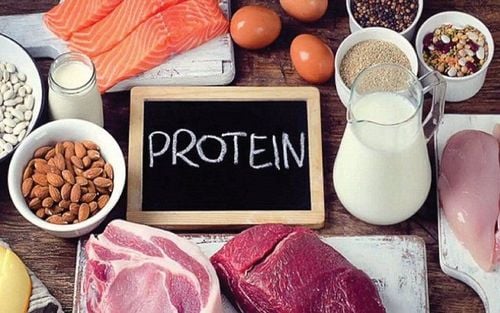This is an automatically translated article.
Whey protein is one of the best supplements in the world. With very high nutritional value, and scientific studies prove the many benefits that whey protein has essential for health.1. What is Whey Protein?
Whey protein is one of the main proteins found in dairy products. As a by-product of cheese production, whey protein provides significant amounts of all the essential amino acids needed to perform the functions inherent in a complete, high-quality protein. body.What are the types of whey protein? Whey protein is mainly in powder form and has 3 main types, including:
Concentrate / Concentrate (Whey Protein Concentrate - WPC); Isolate (Whey Protein Isolate - WPI); Hydrolyzed (Whey Protein Hydrolysate - WPH). Easy to incorporate into your daily diet, you can add whey protein to your drinks, milk or some other dish, such as yogurt, or puree it with ice and fresh fruit for a boost. element. This nutrient is also very digestible, being absorbed from the intestines more quickly than other proteins.
Whey protein is a very popular ingredient in the menu of bodybuilders or sports athletes. Whey protein also addresses health problems associated with nutritional deficiencies.
2. What does whey protein do?
Several case and activity-specific studies using whey protein have shown it to have the following effects:
Recovery from exercise While some evidence suggests that whey protein is essential For exercise, specifically increasing muscle mass and strength, other studies have found no real benefit. But whey protein can still help speed up muscle recovery after intense exercise.

Whey protein có tác dụng hồi phục sau luyện tập thể chất
Treatment of malnutrition Whey protein has the potential to improve weight in people who have difficulty gaining weight and controlling body weight, such as older adults or patients with HIV/AIDS.
Wound healing Whey protein has been shown to benefit the recovery process of burn victims and subjects with chronic wounds.
Reduced risk of allergies In non-breastfed infants, cow's milk protein is a common allergenic ingredient associated with eczema development. At the same time, hydrolyzed soy protein formula with large protein size also has the same effect. Meanwhile, research shows that infants given partially hydrolyzed whey protein formulas and casein-based radical formulas reduce the risk of developing dermatophytosis in at-risk infants. allergies high.
Helpful with Diabetes and Hypertension Whey protein is effective in controlling blood sugar levels, especially when taken with high-carb meals. Meanwhile, whey protein's bioactive peptides, called lactokinins, may also lower blood pressure. Therefore, whey protein is thought to be especially helpful for people with type 2 diabetes and high blood pressure.
Around the issue of what are the benefits of whey protein, experts add that this nutrient also supports weight loss diets, enhances the body's antioxidant protection, has a positive effect on inflammatory bowel disease and certain other inflammatory conditions. Additionally, more studies are needed to provide evidence of whey protein's ability to lower blood cholesterol levels.
3. Safe dosage and side effects
Modern life today means that most of us get enough protein from a varied and healthy diet. But if your body is not able to meet the daily protein requirements due to your physical condition and health condition, you can consult your doctor or nutritionist about whether taking whey protein is necessary and helpful.
3.1. Safe Dosing Whey protein is generally quite safe when taken in appropriate doses. Usually 25 - 50 grams per day (1 - 2 scoops) is the recommended dose, but users should be sure to follow the dosage instructions on the packaging of each packaged product. The concept of using as much as possible is not true with whey protein, in fact the human body can only absorb a limited amount of protein at a given time.

Thông thường 25 - 50 gram mỗi ngày (tương đương 1 - 2 muỗng) là liều lượng được khuyên dùng
3.2. Side effects There are limited data on the adverse effects of high doses of whey protein supplements. However, this nutrient will be contraindicated for those who have milk intolerance syndrome or are allergic to dairy products. On the other hand, some studies also suggest that whey protein carries a risk of gastrointestinal upset, such as nausea, abdominal pain, bloating, cramps, and diarrhea. If you have ever had liver or kidney problems, consult your doctor before deciding to take a protein supplement.
4. Drug interactions
Some possible interactions with the following active ingredients include:
Albendazole (Albenza) Avoid using whey protein if you are having parasitic worm treatment with this medicine. The addition of whey protein may delay or interfere with the effectiveness of the drug.
Alendronate (Fosamax) Using whey protein in tandem with this drug to prevent and treat osteoporosis may decrease how well the body absorbs the drug.
Certain antibiotics Concurrent use of whey protein with quinolone or tetracycline antibiotics also carries the same risk of adverse interactions as the two drugs mentioned above.
In summary, whey protein has great nutritional value and is one of the best food sources of high-quality protein. Whey protein is easily digested and absorbed faster than other proteins. Answering the question of what whey protein does, experts around the world confirm that whey protein is necessary for the process of promoting muscle growth and maintenance when combined with physical training.
Please dial HOTLINE for more information or register for an appointment HERE. Download MyVinmec app to make appointments faster and to manage your bookings easily.
The article references the source: Mayoclinic.org; Heathline.com












